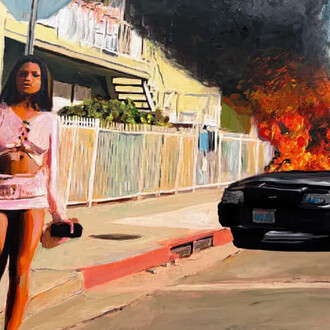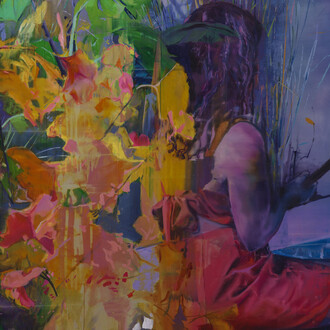Melhop Gallery º7077 in collaboration with Truckee Donner Recreation Center and the Truckee Public Arts Commission are very excited to announce the opening of the Eco exhibition, Field Notes.
Field Notes is a selection of work by 3 women artists, who respond and relate to our unusual and extreme environment in the high-altitude mountains and desert, through various mediums. Contemporary art and artists are like thermometers, sensitive beings that notice and initiate critical dialog on cultural, environment and social issues. Field Notes is the start of a conversation with and about our complex environment.
Julia Schwadron Marianelli is an artist who has shown her work across the country as well as internationally. Her work has been written about in multiple publications including The Brooklyn Rail, The Bangkok Post, and Contemporaryartdaily.com. Schwadron Marianelli served as co-founder of, and the Assistant Director for, the Low Residency MFA in Interdisciplinary Arts at University of Nevada Reno, Lake Tahoe, helping to provide alternative modes for non-traditional students to create sustainable lives in the arts. In addition to her studio practice, she currently serves as an artist mentor, workshop instructor and facilitator, and is on the art faculty at Lake Tahoe Community College. From 2010 – 2011, she was a Visiting Professor of Painting and Artist in Residence at Chiang Mai University, and a Visiting Assistant Professor of Painting at the University of Iowa from 2007-2009. Schwadron Marianelli received a Joan Mitchell Fellowship in 2006, and was a Javits Fellow from 2002-2003. Schwadroni Marianell received her BA in Studio art from UC San Diego in 1998 and her MFA in Painting from the Tyler School of Art in 2004. She currently lives and works in South Lake Tahoe with her husband and two kids, where she continues to advocate for alternatives to traditional art education.
As an artist and trail runner based in South Lake Tahoe, my relationship with the flora and fauna of this region comes from first-person discovery and from passionate research into what makes this mountain landscape unique. Recent paintings have included images of the South Lake Tahoe Forest in the aftermath the Caldor Fire. Much of the forest floor was covered in hot pink fire-retardant dust when we returned – a surreal filter placed on top of the familiar landscape. My paintings begin with the language that human beings superimpose upon the natural environment to either understand it, dominate it, use it, or frame it in some way. Through the combination of text and natural imagery, the paintings might become a portal through which to reflect on each of our relationship to our environment.
In recent paintings, I often use text phrases that function as titles to begin a composition. These refer to both the natural environment and the human psyche. One painting, “Suppression Tactics” was conceived of as I considered the wildfire conditions in west alongside the systemic ways that information is kept from the people who need it most. In the painting “Disturbed Sites,” I’m borrowing the pink filter of fire retardant, dropped from planes, and left on the post-fire landscape to refer to the way that these disturbances can be both uncanny and generative. The text matrix as the first layer is meant as a place holder for thought as well as a visual structure to organize the painting itself. By layering and weaving the text in and out through features of the natural landscape, the painting might become a site to contemplate this alchemy. In still other paintings, I imagine the landscape communicating directly through leaving its own organic mark versus translating it into text myself. In works such as “Bank Breach” and “Weed Impunity” I am painting on top of fabric that has been bundled dyed in advance with local plants, literally embedding the plants themselves into the cotton. I imagine the finished painting as a kind of collaborative gesture with the landscape.
(Julia Schwadron Marianelli)
Jean Brennan received her MFA in Interdisciplinary Arts from Sierra Nevada University in 2019. She holds a Masters degree in Communications Design from Pratt Institute and a Bachelors in World Literature and Cultural Studies from the University of California at Santa Cruz. In 2003, she completed an apprenticeship in ecological horticulture with the Center for Agroecology and Sustainable Food Systems at UCSC. This diverse course of study informs a love for plants and language and a transdisciplinary approach to making. Jean has exhibited in solo and group shows in New York, Amsterdam, California, the Hudson Valley, and Nevada. She is a Professor in the Graduate MFA Communications Design Department at Pratt Institute, NYC.
At its essence, my art practice is a method for being in place; it is a meditation, or a finding resonance, with a specific site. Embracing a symbiotic view of life, I attempt to collaborate with plants, animals, and atmospheric forces, to make visible, invisible or hidden elements—in this case, the wind and the language of the forest. I am interested in how the poetics of visual form might destabilize an anthropocentric view of the natural world.
As an interdisciplinary artist, I work at the intersection between ecology, language, alchemy, and the body. Recurring themes include a fascination with atmospheric forces, plants, phenomenology, and color. Using the lyrical essay as method, I loosely assemble scientific research, historical and pop culture references with personal reflection, to explore our relationship to the natural world, interspecies dependency, and models of resiliency. I use design to publish, archive, and visually score projects that may include installation, video, sculpture and performance.
Megan Berner is a visual artist living and working in Reno, Nevada. She graduated with her MFA in Intermedia from the University of Iowa with a minor in drawing. Megan works with digital and experimental techniques such as instant film, digital transfers, and cyanotypes. Her work is greatly influenced by the landscape of her native Nevada home as well as the vast prairies of the Midwest, being a twin, mapping and exploration, and countless hours of daydreaming. She creates site-specific installations that incorporate video and sound and constructs performative scenes that ultimately exist as photographs. Other forms her artwork takes include artist's books, collaborative interactions, textile projects, and narrative videos.
Megan's work has been shown nationally and internationally and is part of multiple collections including the Center for Art and Environment at the Nevada Museum of Art, University of Arizona Art Museum, the University of Iowa Special Collections, and Southern Graphics Council International Archive.
My artwork explores my introspective relationship with the environment and the many and complicated ways that I interact with it and how that creates meaning for the places in our lives — how we impact them and how they impact us. It is my hope that I can create a space through my artwork for others to daydream, explore, and discover a new way of looking at the world around them and, through that, bring a self-awareness that just might reflect back into our everyday relationships with people and the environment around us. All of us have different places that we can claim to be our own because of our unique experiences there. The idea of place becomes much more internalized and individual. Memories and experiences, those things we carry with us, are projected onto the present landscape--our own personal maps and reference points. My relationship with the environment feels very personal--it is a part of my identity and how I move through the world.
Coming from a desert home, I have always been drawn to more desolate, inhospitable, and subtle landscapes—places that seem to only show themselves to those who spend time in them and seek out what they have to offer. For me, they invite introspection and reflection on the complexity of human-place relationships and our own internal-external manifestations of these relationships.
In my work, I explore the ways we interact with our environment—how we form relationships with it and how those connections influence our interpretation of the world around us—what marks we leave behind, the experiences—intangible and manifest, and the action of moving through or being in a place.
I am interested in liminal spaces, internal and external—spaces that are transitional and in-between, not quite here or there. Mirages and other light phenomena, states of meditation, suspended moments, and dream states all occupy this kind of territory. My work aims to create these types of environments and experiences, inviting the viewer into a more personal and psychological experience of the space.










